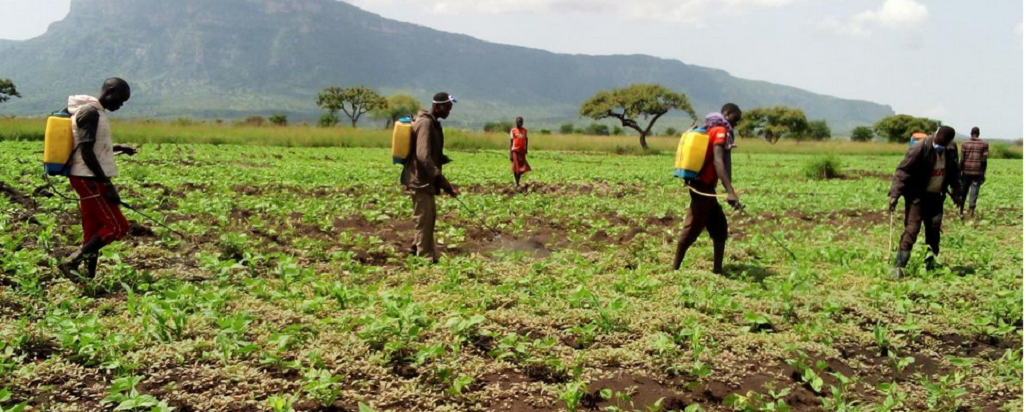Farmers in Iriiri sub county jointly spraying their crops in the garden.
Residents of Napak district have embraced group farming as a means to enhance agricultural productivity, ensure food security, and improve livelihoods. The farmers have organized themselves into groups consisting of 10 to 40 members, cultivating up to five acres of land, depending on the group size.
With sufficient manpower and resources, they have planted a variety of crops, including sorghum, maize, and sunflower. Jimmy Lomakol, a lead farmer in Lorengecora Sub County, shared that the group farming initiative was born out of the realization that some individuals lacked the resources to cultivate their lands independently.
He explained that through group efforts, farmers can pool resources to purchase agricultural necessities such as pesticides, seeds, and tractor hire. This collaborative approach has been particularly beneficial, enabling timely planting during the rainy season and increasing their expectations for a bumper harvest.
Despite their success, the farmers face challenges such as unpredictable weather patterns, the availability of poor-quality seeds in the market, and security concerns that hinder their farming projects. To address these obstacles, the farmers call on the government to provide them with knowledge on mechanized agriculture and the proper timing of rains.
James Teko, another lead farmer in Nabwal Sub County, expressed that group farming has motivated individuals with limited farming experience to actively participate in agricultural production. This has led to an increase in crop yields, and after the harvest, the produce is divided equally among group members, with the surplus donated to vulnerable individuals, such as the elderly and orphans.
Rhoda Auma, a farmer in Iriiri Sub County, shared her excitement about the expected abundant harvest of maize, beans, and groundnuts due to the adoption of new farming techniques, proper crop management, and timely planting.
Faith Nakut, the Woman Member of Parliament for Napak district, acknowledged the promising good harvest this season but cautioned farmers not to be complacent, emphasizing that it might not be enough to sustain their families in the long term.
She advised against selling produce to private buyers at low prices, as it can compromise household food security. Nakut urged the government to address insecurity issues in the region to encourage full participation in farming and boost food production.
John Loduk, an elder in Lorengedwat trading center, attributed the bumper harvest to reliable rains in the green belt areas of Nabwal, Iriiri, and Apeitolim. He advised community members not to rush to sell their harvested grains to food merchants from neighboring districts to avoid future hunger and high prices when buying back the produce from dealers.
’We have suffered a lot with the hunger crisis, I urge my people to resist the temptation of selling their harvest to meet their needs because we might end up buying those food stuff at a high price when the produce dealers return to sell back to us’’ Loduk reiterated.
-URN




